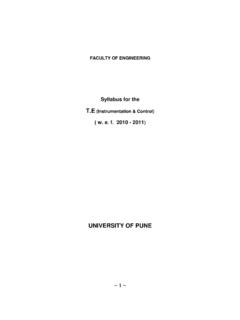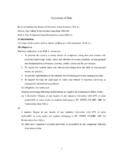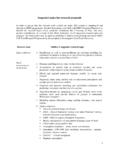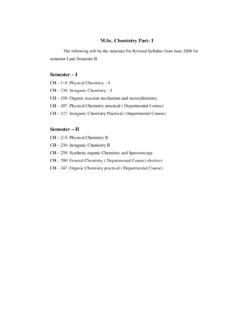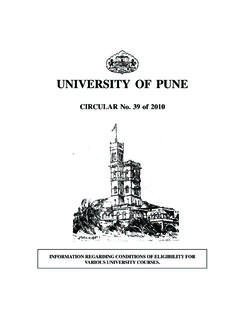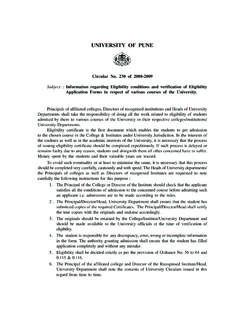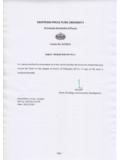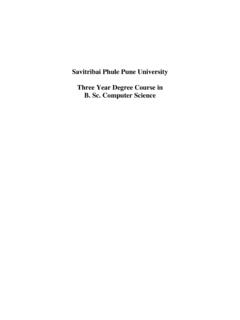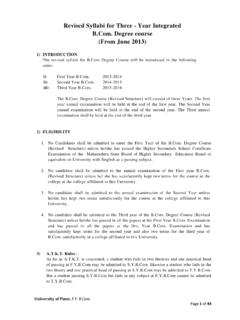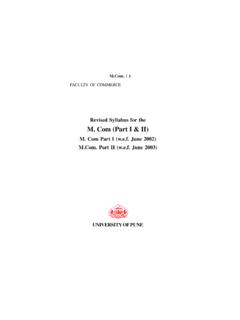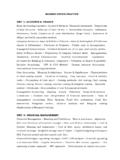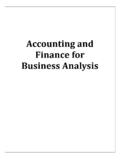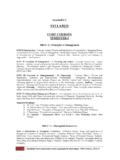Transcription of Master’s Degree Course in Commerce (M.Com.) - …
1 Part I, [External] 2015-16 Page 1 of 46 Master s Degree Course in Commerce ( ) - External Revised with effect from 2015-16 (1) Objectives : 1. To equip and train our post graduate students to accept the challenges of 21st Century 2. To Study and analyse the new industrial and commercial culture 3. To make aware the students for acquiring the knowledge of specialised subjects. 4. To understand and measure current events, develop independent logical thinking, train towards personality development 5. To equip the students for seeking suitable employment and entreprenurship ability 6. To impart knowledge and develop understanding of research methodology and its application 7. To study methods of Data Collection and its interpretations to develop communication and analytical skills in generalization of things, concepts and symbols used in business. (2) The Degree shall be second Degree building on the base provided at Degree level.
2 The Degree programme provides an opportunity to acquire advanced knowledge in the main areas of Commerce . A student who has passed Degree examination of this University or any other recongized University shall be admitted to Course . (3) The Course will be of 2 years duration consisting of 2 parts Part I and Part II. At each part there will be 4 papers of 100 marks each. Thus Degree examination-Part I and II shall be of 800 Marks. The following shall be the scheme of papers Part I Course Code Subject Compulsory Paper 101 Management Accounting and Financial Analysis and Control 102 (A) 102 (B) Choose any one Subject of the following as a Compulsory Paper Strategic Management Industrial Economics Choose any one Group of the following as a Special Paper Group A Advanced Accounting & Taxation 103 Advanced Accounting & Taxation Special Paper I Title -: Advanced Accounting and Income Tax 104 Advanced Accounting & Taxation Special Paper II Title -: Specialized Areas in Accounting and Business Tax Assessment & Planning.
3 Group B Commercial Laws & Practices 105 Commercial Laws & Practices Special Paper I Title -: Information system & E- Commerce practices & Intellectual Property Laws Part I, [External] 2015-16 Page 2 of 46 106 Commercial Laws & Practices Special Paper II Title -: E-Security & Cyber Laws and Laws Regulation to Copyrights & Design. Group C Advanced Cost Accounting & Cost system 107 Advanced Cost Accounting & Cost system Special Paper I Title -: Advanced Cost Accounting. 108 Advanced Cost Accounting & Cost system Special Paper II Title -: Cost Control and Cost Systems. Group D Co-operation & Rural Development 109 Co-operation & Rural Development Special Paper I Title -: Co-operative Movement in India and Abroad. 110 Co-operation & Rural Development Special Paper II Title -: Organization and Management of Co-operative Business. Group E Business Practices & Environment 111 Business Practices & Environment Special Paper I Title -: Organized Trade Markets 112 Business Practices & Environment Special Paper II Title -: Modern Business Practices Group F Business Administration 113 Business Administration Special Paper I Title -: Production Operation and Financial Management / Knowledge Management.
4 114 Business Administration Special Paper II Title -: Business Ethics, Professional Values. Group G Advanced Banking & Finance 115 Advanced Banking & Finance Special Paper I Title -: Law & Practices of Banking 116 Advanced Banking & Finance Special Paper II Title -: Central Banking & Monetary Policy Group H Advanced Marketing 117 Advanced Marketing Special Paper I Title -: Marketing Management 118 Advanced Marketing Special Paper II Title -: Customer Relationship Management & Retailing Part II Part I, [External] 2015-16 Page 3 of 46 Course Code Subject Compulsory Paper 201 Business Finance 202 (A) 202 (B) Choose any one Subject of the following as a Compulsory Paper Research Methodology for Business Industrial Economic Environment Choose any one Group of the following as a Special Paper Group A Advanced Accounting & Taxation 203 Advanced Accounting & Taxation Special Paper III Title -: Advanced Auditing and Specialized Areas in Auditing 204 Advanced Accounting & Taxation Special Paper IV Title.
5 Recent Advances in Accounting, Taxation & Auditing and Case Studies. Group B Commercial Laws & Practices 205 Commercial Laws & Practices Special Paper III Title -: Laws Relating to International Business and WTO - Norms & Practices. 206 Commercial Laws & Practices Special Paper IV Title -: Recent Advances in Commercial Laws and Practices and Case Studies. Group C Advanced Cost Accounting & Cost system 207 Advanced Cost Accounting & Cost system Special Paper III Title -: Cost and Management Audit. 208 Advanced Cost Accounting & Cost system Special Paper IV Title -: Recent Advances in Cost Accounting and Case Studies in Cost and Works Accounting. Group D Co-operation & Rural Development 209 Co-operation & Rural Development Special Paper III Title -: Co-operative credit and Banking system. 210 Co-operation & Rural Development Special Paper IV Title -: Recent Advances and Case Studies in Co-operation. Group E Business Practices & Environment 211 Business Practices & Environment Special Paper III Title -: Entrepreneurial Behavior and Entrepreneurial Development Pattern 212 Business Practices & Environment Special Paper IV Title -: Recent Advances in Business Practices, Environment and Case Part I, [External] 2015-16 Page 4 of 46 Studies Group F Business Administration 213 Business Administration Special Paper III Title -: Human Resource Management and Organizational Behavior.
6 214 Business Administration Special Paper IV Title -: Recent Advances in Business Administration and Case Studies. Group G Advanced Banking & Finance 215 Advanced Banking & Finance Special Paper III Title -: Foreign Exchange & International Finance. 216 Advanced Banking & Finance Special Paper IV Title -: Research Methodology & Case Studies. Group H Advanced Marketing 217 Advanced Marketing Special Paper III Title -: Marketing Research & International Marketing 218 Advanced Marketing Special Paper IV Title -: Recent Trends in Marketing (4 ) Standard of Passing A candidate is required to obtain at least 40 marks out of 100 to pass in each paper at the Annual Examination (in case of regular candidates 32 marks out of 80 marks at the Annual Examination). A regular candidate shall be declared to have passed in the paper provided he/she has secured an agreegate of 40% marks in the Term End and Annual Examination taken together in paper.
7 Passing in Term End examination is not compulsory. A candidate having 32 marks out of 80 marks in the Annual Examination and Term End Examination taken together may improve his performance in the paper by appearing only for Annual Examination. (5) Award of Class : The class in respect of Examination be awarded to the candidates on the basis of aggregate marks obtained by them in all the eight papers at the Part I and II together. The award of Class shall be as under : i. 70% and above : First Class with Distinction ii. 60% and above but less : First Class than 70% iii. 55% and above but less : Higher Second than 60% iv. 50% and above but less : Second Class than 55% v. 40% and above but less : Pass Class than 50% vi. Less than 40% : Failure At the time of filling the examination (Part I/II) from a candidate is allowed to exercise the option by submit-ting declaration authorizing the University to declare as failed in case of his/her aggregate marks failing below In that case for exemption the candidate has to obtain 55% marks in each paper.
8 The candidate who has opted option can cancel the same within 3 months from the date Part I, [External] 2015-16 Page 5 of 46 of declaration of the result. The Class Improvement Scheme shall be continued. The improvement of Performance shall be allowed only at the Annual Examination. (6) A Candidate after passing Examination will be allowed to appear in the other Special subject after keeping necessary terms in the Special Subject only, for which only Passing Certificate will be issued. (7) The Use of Marathi writing answers except in the following subjects is allowed. a. Management Accounting b. Advanced Accounting and Taxation c. Advanced Cost Accounting and Cost Systems (8) The following shall be equivalence given to the Subjects/Papers under old and revised Courses: (9) The student (will be admitted to Revised M. Com. Course with effect from June 2002. For the students who have completed the terms for first year as per old Course will be admitted to the second year as per old Course The examination as per old Course will be held simultaneously for three years from April/ May 2002 for old Course students & repeaters.)
9 Part I, [External] 2015-16 Page 6 of 46 Part I Compulsory Paper Subject Name -: Management Accounting and Financial Analysis and Control Course Code -: 101 Objective -: The objective of the Course is to enable students to acquire sound Knowledge of concepts, methods and techniques of management accounting and to make the students develop competence with their usage in managerial decision making and control. I - TERM MAAGEMENT ACCOUNTING UNIT TOPIC I BASIC CONCEPTS: Management Accounting- Meaning and Definition, Characteristics, Objectives, scope and functions of Management Accounting Financial Accounting, Cost Accounting and Management Accounting Tools and Techniques of Management Accounting - Advantages and Limitations of Management Accounting - Installation of Management Accounting System-Management Accountant : functions and duties - Essential qualities. II FINANCIAL STATEMENT ANALYSYS: Introduction - objectives of analysis of financial statement-tools of financial statement analysis - Multi - step income statement, Horizontal analysis, Commonsized analysis, Trend analysis, Analytical Balance Sheet.
10 III RATIO ANALYSIS: Ratio Analysis-Meaning and rationale, advantages and limitations. Types of Ratios -: Liquidity Ratios, Solvency Ratios, Profitability Ratios, Efficiency Ratios, Integrated Ratios. IV FUND FLOW AND CASH FLOW STATEMENT: A. Meaning of Fund flow statement -Uses of fund flow statement, Funds Flow Statement and Income Statement. Preparation of Funds Flow Statement. B. Meaning of Cash flow statement - Preparation of Cash Flow Statement. Difference between Cash Flow Analysis and Funds Flow Analysis. Utility of Cash flow Analysis. Limitations of Cash Flow Analysis. V WORKING CAPITAL MANAGEMENT: Concept and definition of working capital - Determination of Working capital - Assessment of Working Capital needs - Stud y of components of working capital, such as cash management, accounts receivable management and inventory management. VI RESPONSIBILITY ACCOUNTING: Meaning, objectives and structure of Responsibility Accounting as a divisional performance measurement.
